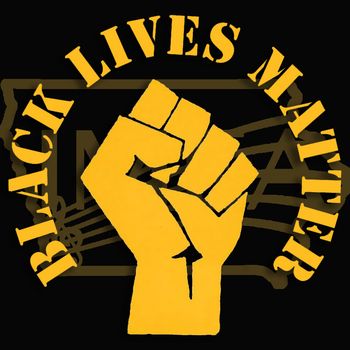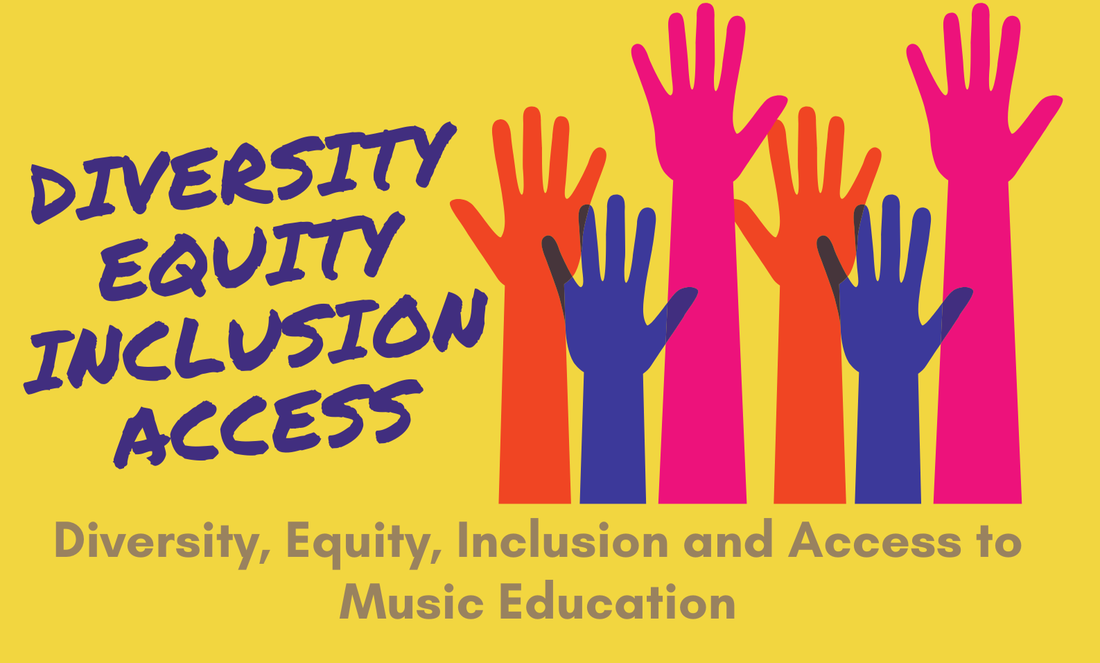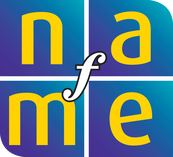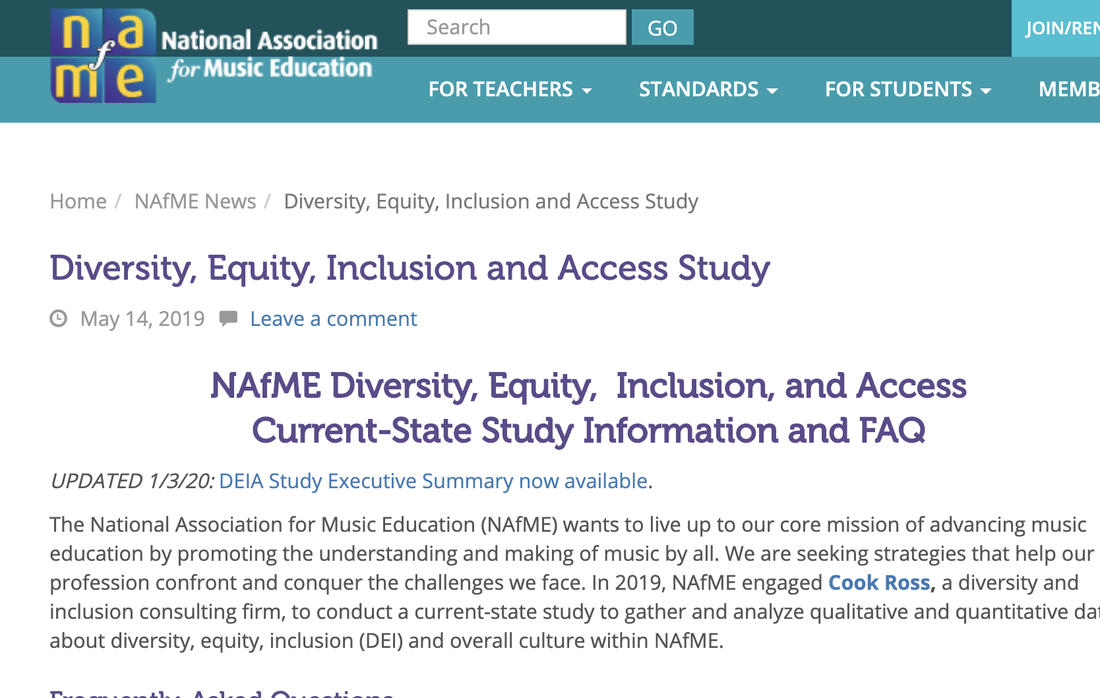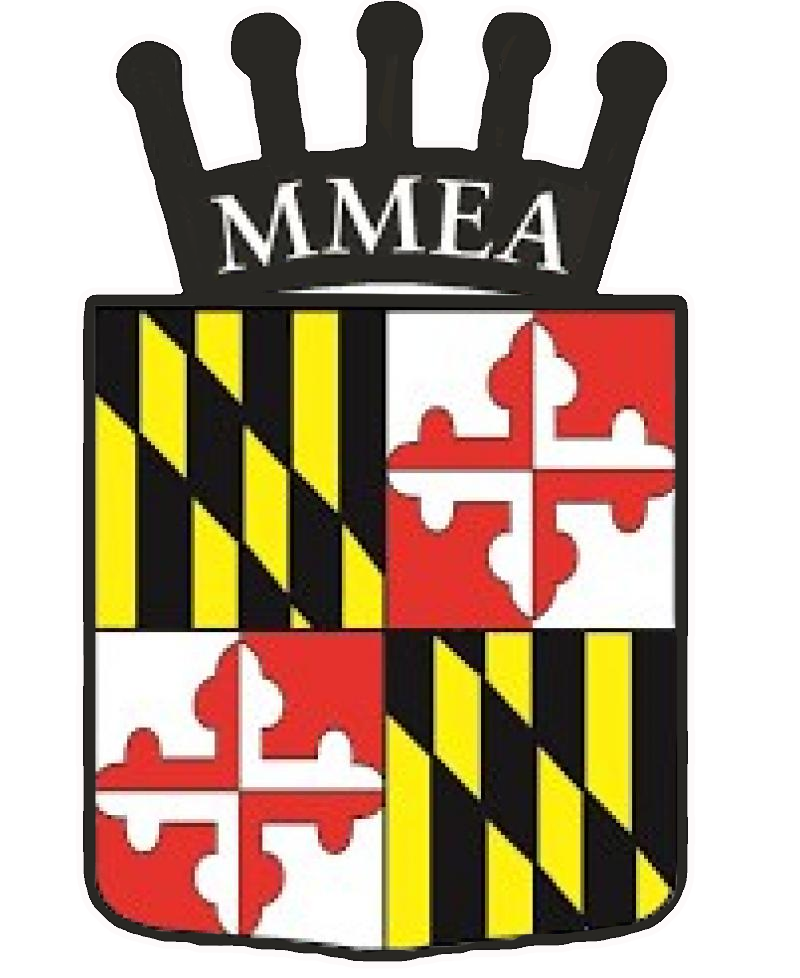Statement on Diversity, Equity, Inclusion and AccessThe Iowa Music Educators Association believes that BLACK LIVES MATTER.
Throughout the coronavirus pandemic and beyond, we have had our eyes reopened to the tremendous inequality that has for too long existed for our black students - in matters of family income, access to health care, access to education and opportunity, and significantly, in police policies. |
We see these inequities, and, although many areas of our state are not racially diverse, we grieve with our black students as well as well as with the black community nationally and yearn for change.
We also believe in the tremendous power of music to express emotion, to create solidarity, and ultimately, to help heal. The relationships built in the learning and making of music are strong ones. Our students are hurting and they turn to the mentors in their lives to try to make sense of it all. We can tell them that we see them - that we hear them - and that we will always be there for them.
Martin Luther King, Jr., in his letter from the Birmingham Jail, cautioned against preferring “a negative peace (the absence of tension) to a positive peace (the presence of justice)” and went on to say “shallow understanding from people of good will is more frustrating than absolute misunderstanding from people of ill will.” The Iowa Music Educators Association will strive for Dr. King’s “positive peace” through non-violence and courageous conversation about what WE can do.
We are committed to learning more about our students, facing racial injustice, standing in solidarity, and supporting justice within music education and our country. We are committed to seeking out and promoting resources to help students and teachers navigate social justice issues. We are committed to making our classrooms more inclusive, more understanding, more attentive and informed places. We are committed to removing implicit bias. We are listening. And we invite all music educators in listening, learning and moving forward in this journey towards greater understanding.
We also believe in the tremendous power of music to express emotion, to create solidarity, and ultimately, to help heal. The relationships built in the learning and making of music are strong ones. Our students are hurting and they turn to the mentors in their lives to try to make sense of it all. We can tell them that we see them - that we hear them - and that we will always be there for them.
Martin Luther King, Jr., in his letter from the Birmingham Jail, cautioned against preferring “a negative peace (the absence of tension) to a positive peace (the presence of justice)” and went on to say “shallow understanding from people of good will is more frustrating than absolute misunderstanding from people of ill will.” The Iowa Music Educators Association will strive for Dr. King’s “positive peace” through non-violence and courageous conversation about what WE can do.
We are committed to learning more about our students, facing racial injustice, standing in solidarity, and supporting justice within music education and our country. We are committed to seeking out and promoting resources to help students and teachers navigate social justice issues. We are committed to making our classrooms more inclusive, more understanding, more attentive and informed places. We are committed to removing implicit bias. We are listening. And we invite all music educators in listening, learning and moving forward in this journey towards greater understanding.
Attend a DEIA SessionJoin us in discussions about Diversity, Equity, Inclusion and Access to Music Education in Iowa. Learn more
|
Resources
Antiracism in Music Education
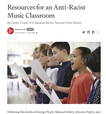
Resources for an Anti-Racist Music Classroom. A website created by Carey Crows, K-2 General Music Teacher from Illinois and hosted by publisher McGraw-Hill provides likes of articles, books, organizations, websites, podcasts, webinars, videos and childrens books to help make your music classroom an anti-racist music classroom.
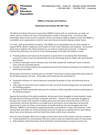
After the killing of George Floyd, the Minnesota Music Educators Association released this statement which outlines their intention to take meaningful steps to put an end to systemic racism and violence against people of color. MMEA is committed as an organization to lend its voice and resources toward shaping a better future.
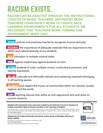
What Antiracist Music Teachers Do - Published by the Society for Music Teacher Education collaboration of Cultural Diversity and Social Justice Areas of Strategic Planning & Action (ASPA)
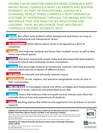
Qualities of Antiracist Music Curricula - Published by the Society for Music Teacher Education collaboration of Cultural Diversity and Social Justice Areas of Strategic Planning & Action (ASPA)

Children's Health Council Anti-Racism Resources for Families and Educators - Collection of articles, books, podcasts, movies to help educators and families talk to children about racism.

Anti-Racist Resources from Greater Good - The mission at the Greater Good Science Center is to elevate the human potential for compassion. In response to the killing of unarmed black people by police, Greater Good gathered pieces from Greater Good magazine that explore our potential to reduce prejudice in society and in ourselves.
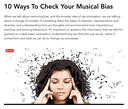
10 Ways To Check Your Musical Bias. "When we talk about removing bias' and the broader idea of decolonisation, we are talking about a change of mindset. It's breaking down the ideas of tokenism, representation and diversity, and understanding how our thoughts and environments have impacted our teaching and learning behaviours. It's important to question the information that we take for granted on a daily basis, and seek to understand why we think the way we do, where it comes from and what we can do to change our processes."
Decolonization of the Music Room
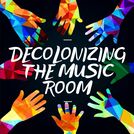
Decolonizing the Music Room - Helping music educators develop critical practices through research, training and discourse to build a more equitable future. "Our work means centering BBIA (Black, Brown, Indigenous, and Asian) voices, knowledge, and experiences to challenge the historical dominance of white Western European and American music, narratives, and practices that has resulted in minimization and erasure throughout our field. There is no end point of being "decolonized," only constant learning, reflecting and growing."
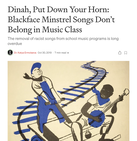
Dinah, Put Down Your Horn: Blackface Minstrel Songs Don’t Belong in Music Class. By Dr. Katya Ermolaeva
Musicologist, music editor, music educator & musicological consultant. "Blackface minstrel songs, the racist relic right under our noses, must be recognized for what they are and removed from children’s music programs if we want to move forward toward justice and equity as a society."
Musicologist, music editor, music educator & musicological consultant. "Blackface minstrel songs, the racist relic right under our noses, must be recognized for what they are and removed from children’s music programs if we want to move forward toward justice and equity as a society."

2020 List of Pieces to be Reconsidered or Removed: This is a Google Sheet of choral music and songs with problematic histories. Includes reasons for reconsideration. "It is by no means exhaustive nor academically reviewed. It is simply a starting place to discuss the presence of minstrelsy in music education
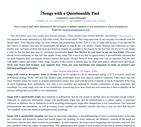
Songs with a Questionable Past. Compiled by Lauren McDougle This list of questionable songs is categorized into (1) Songs with Racist or Derogatory Terms or Themes, (2) Songs with Questionable Origins, Meaning, or Authenticity and (3) Songs with Adult Themes.
Composers

Institute for Composer Diversity - The Institute for Composer Diversity, winner of the 2018 ASCAP Deems Taylor/Virgil Thomson Media/Internet Award and housed at the State University of New York at Fredonia, is dedicated to the celebration, education, and advocacy of music created by composers from historically underrepresented groups through online tools, research-based resources, and sponsored initiatives.

ColourFULL Music - ColourFULL Music, along with other groups, is making a concerted effort towards another kind of "new norm" - wind band concert programs that represent a diverse selection of composers.
And We Were Heard - And We Were Heard is giving underrepresented composers a platform to have their music heard. Composers that submit works to … And We Were Heard are matched with top-notch wind bands and engage in collaborative recording sessions. The resulting audio tracks are hosted on our site along with innovative ideas of how to support diverse voices in music.
Culturally Diverse Music
TeachRock - Empowes teachers and engage students by using popular music to create interdisciplinary, culturally responsive education materials for all 21st century classrooms.
Cultural Appropriation: From Culture Stealing to Culture Sharing by Eugene Holley Jr - How can choruses explore music from cultures other than their own in a respectful way? Rollo Dilworth’s research provides a framework for thinking about cultural appropriation and its intersection with choral music.
Social Justice
Teaching Social Justice in the Music Classroom by Andrew S. Berman - Music educators can open the door to dialogue and understanding of what can be difficult subjects to address. This article originally appeared in the April 2015 edition of Teaching Music Magazine
Equity in Music Education: Why Equity and Social Justice in Music Education? by Juliet Hess. Music Educators Journal, March 2017
Bradley, D. (2006). Music Education, Multiculturalism, and Anti-Racism – Can We Talk?Action, Criticism, and Theory for Music Education 5(2), 2-30.
NPR (2020) - What Systemic Racism Means And The Way It Harms Communities. Morning Edition, July 1, 2020.
Books
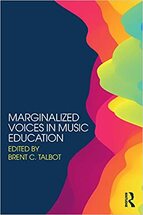
Marginalized Voices in Music Education by Brent C. Talbot (Editor)
|
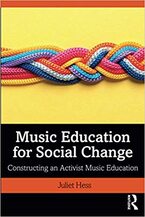
Music Education for Social Change: Constructing an Activist Music Education by Juliet Hess (Author)
|
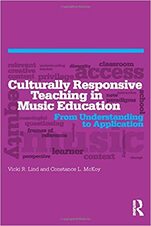
Culturally Responsive Teaching in Music Education by Vicki R. Lind (Author), Constance McKoy (Contributor)
|
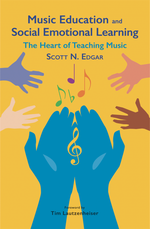
Music Education and Social Emotional Learning by Scott N. Edgar. This pioneering book by Scott Edgar addresses how music educators can utilize Social Emotional Learning (SEL) to maximize learning in the choral, instrumental, and general music classroom at all levels, and at the same time support a student’s social and emotional growth.
|
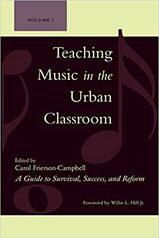
Teaching Music in the Urban Classroom: A Guide to Survival, Success and Reform - ed. Carol Frierson-Campbell, Rowman & Littlefield.
|
Groups and Organizations
Decolonizing the Music Room - Helping music educators develop critical practices through research, training and discourse to build a more equitable future.
Justice Choir - Justice Choir is a template to encourage more community singing for social and environmental justice. Designed around our Justice Choir Songbook, our goal is a grassroots movement to engage in the empathetic, collaborative, and collective power of singing together to create change.
Little Kids Rock - This is a network of thousands of K-12 teachers across 45 states leads a national movement that brings innovative and inclusive music education to students. Using genres including rock, pop, Latin, and rap, the Little Kids Rock program empowers teachers to build music programs as diverse as the kids they serve.
|
In 2019, NAfME engaged Cook Ross, a diversity and inclusion consulting firm, to conduct a current-state study to gather and analyze qualitative and quantitative data about diversity, equity, inclusion (DEI) and overall culture within NAfME. Download DEIA Study Executive Summary
|
Children with Exceptionalities
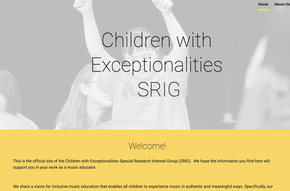
Children with Exceptionalities Special Interest Research Group - Wonderful website of resources for teaching music to children with special needs
Diversity & Equity in other States
|
Maryland Music Educators Association - Maryland MEA changed the guidelines for their Fall 2020 Solo & Ensemble so there "there is no approved repertoire list, no instrument/vocal styling restrictions, and students and educators are encouraged to select repertoire that is representative of the student’s personal experiences and culture."
The goals of their festival are: |
- Elevate music and performances of music that represent the unique experiences and cultural diversity of our students.
- Encourage selection of repertoire not currently on the state list.
- Develop skills and musical growth for independent small groups and soloists emphasizing collaboration and musical critical thinking.
- Encourage the inclusion of instruments not currently represented in standard choral and instrumental ensembles.
- Provide feedback from knowledgeable adjudicators on students’ performance and technical skills.
Diversity Committee
Cassie Bechard
Dan Black
Kat Mosiman
Loida Pineda
Mary Anne Sims, chair
Julia Weisshaar-Mullin
Dan Black
Kat Mosiman
Loida Pineda
Mary Anne Sims, chair
Julia Weisshaar-Mullin

